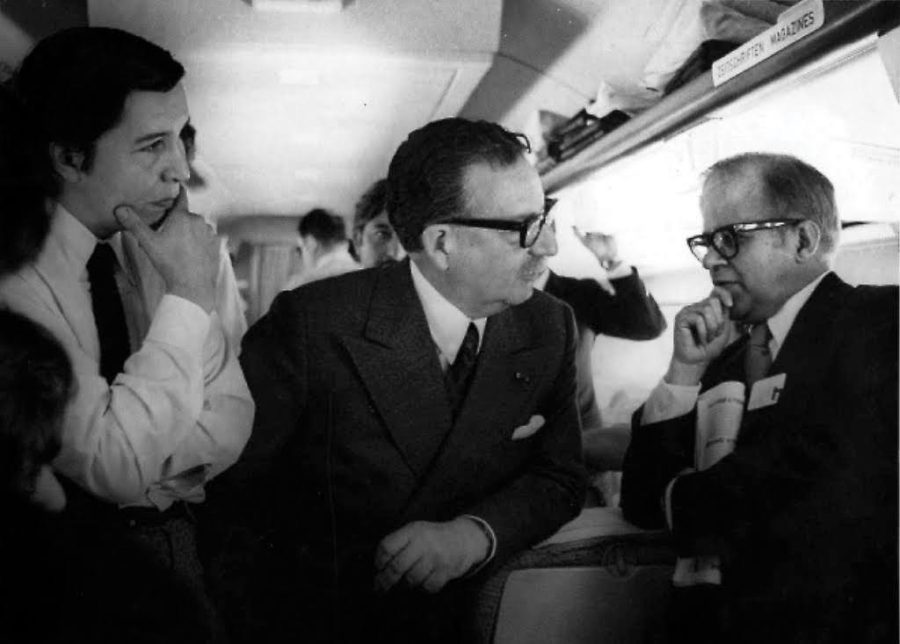Opinion | Hope remains for Chileans despite vote
Photo courtesy Biblioteca del Congreso Nacional/Wikimedia Commons
28th Chilean President Salvador Allende speaks to journalist José María Navasal during his term. Senior columnist Eddie Ryan argues that there is hope for Chileans despite the result of the newly proposed charter on Sept. 4.
Sep 12, 2022
Sept. 11, 1973, was the date of a nefarious coup in Chile which replaced its democratically-elected socialist president, Salvador Allende, with the vile Augusto Pinochet.
A defining moment in the history of covert Cold War action, the coup was sponsored by the Nixon administration. In fact, it was in the works before Allende was even sworn in.
In 1970, Secretary of State Henry Kissinger sent teams of hired killers — “death squads” — into Chile, one of whose victims was General René Schneider. His crime was opposing the notion of a military coup; his punishment made clear America’s lethal aversion to socialism in the Western hemisphere.
Three years later, one of the most brutal dictatorships in Cold War Latin America and the world took hold. The United States’ influence on the newly- reactionary Chilean police state did not cease at inception. Instead, it ran all the way to 1980 when Pinochet’s constitution was finalized through the “Chicago Boys.”
This group of University of Chicago-trained Chilean economists who were students of Milton Friedman helped produce the harsh constitution, which gave Chile one of the weakest social safety nets in the world and underpinned the Pinochet terror regime.
Get The Daily Illini in your inbox!
That document remained in place until 2020, decades after Pinochet left office. In a historic referendum spearheaded by President Gabriel Boric, over 78% of Chileans voted for a rewrite. It’s encouraging to think that this time around, Chileans can weigh the grave memory of their Sept. 11 against a measure of progress toward healing.
Unfortunately, but unsurprisingly, progress travels slower than idealism. On Sept. 4, a solid majority of Chileans voted against the newly proposed and very left-wing charter.
Even though many major outlets exaggerated the extent of this defeat, the vote wasn’t close. There seem to be several clear reasons for this result.
For one, the draft is very ambitious. Leftists used their majority in Chile’s legislature to propose a vast array of progressive measures, from legal abortion to universal health care to climate protection. Indigenous groups, which account for around 13% of Chile’s population, would have gained more rights and gender parity in government would have become mandatory. Overall, the charter would have enshrined more rights than any in the world if ratified.
These provisions would excite left wingers in Norway or Denmark. On paper, the draft seems like a wishlist for progressive legislators worldwide. Passing it in Chile, a country conditioned to conservatism and then meek centrism for decades, was perhaps too much to expect.
What’s more, some Chileans were evidently turned off by the conduct and demeanor of a few individual legislators. Such disturbances of image can tank initiatives as fragile as this one.
The no-vote is certainly a disappointing setback for anyone who values the litany of rights — human, animal and natural — that the constitution would have assured, and the legislature will have to go back to the drawing board.
If they’re lucky, progressives will have another chance to propose a replacement for the Pinochet constitution. In the worst-case scenario, conservatives renege and insist that the old document be kept as law of the land.
Nevertheless, these circumstances offer hope and a few key lessons to Chileans seeking to revitalize their democracy. The results of the 2020 referendum still stand: Chileans wish to banish the ghost of Pinochet once and for all.
Progressives and leftists can still fight to drastically improve Chile’s abysmal levels of spending on public services and advocate for some or many of the originally proposed rights. They will have to find a way to narrow the charter’s scope to ensure its passage without compromising too willingly — a tact required of all progressive governments facing reaction.
It’s worth considering that passing a comparable but narrower constitution could benefit the Boric administration in the long run; a government that delivers something tends to beat an incompetent one with grander promises.
At the same time, the bold vision of Chilean leftists sends a message to comrades elsewhere. Namely, demand more than you can plausibly expect to get. American progressives have demonstrated the effectiveness of this approach in recent years. For all the ridicule heaped on the Green New Deal, it’s hard to imagine the Democrats’ recent spending package without the leftward pressure progressives have exerted on Biden since his campaign.
In any case, the circumstances grant Allende’s final public pronouncement, made just before his death on Sept. 11, 1973, a chilling timbre: “The seeds we planted in the noble consciousness of thousands of Chileans can never be prevented from bearing fruit … Much sooner than later, the great avenues towards a new society will open again, and the march along that road will continue.”
Allende’s defiance was prescient. Now, just shy of 50 years later, Chileans have taken another step on their march toward an equal, pluralistic democracy. It’s a struggle that ought to rouse solidarity everywhere.
Eddie is a senior in LAS.






